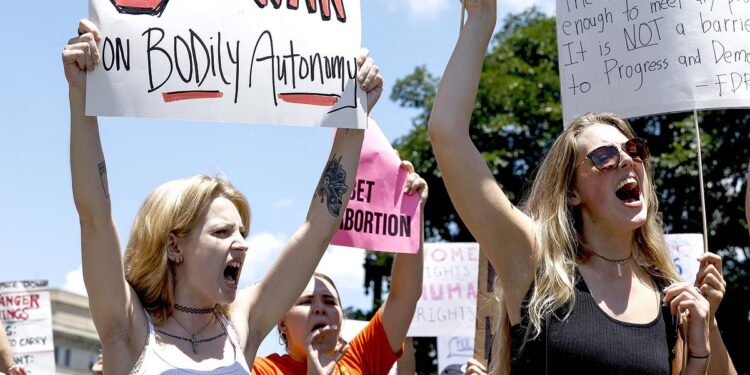This is The Marshall Project’s Closing Argument newsletter, a weekly deep dive into a key criminal justice issue. Want this delivered to your inbox? Subscribe to future newsletters.
For years before the Supreme Court upended Roe v. Wade, the landmark precedent protecting abortion access, a network of conservative Christians was slowly and methodically stacking the courts through political means. “[W]hat Trump and his Republican allies had done was to change the country by leveraging political force to conquer the courts,” Elizabeth Dias and Lisa Lerer wrote in their recent recounting of the network’s maneuvering for The New York Times Magazine.
“Their policy arms churned out legal arguments and medical studies. Their lawyers argued their cases, and their judges ruled on them,” Dias and Lerer explained.
This strategy helps to decode the ever-changing post-Roe legal landscape. With Roe out of the way, and with many courts stacked in their favor, conservative state legislatures have continued to pass increasingly restrictive and punitive abortion laws. At least 14 states have banned abortion with limited exceptions since the Dobbs v. Jackson Women’s Health Organization decision ended Roe in 2022. Another seven states have banned the procedure before 18 weeks, according to the Guttmacher Institute, a research organization that advocates for reproductive rights, including abortion.
Nearly two years after Dobbs, the legality of abortion in the United States is still being debated in court. A total of 40 cases have challenged abortion bans in 23 states as of January, according to the think tank Brennan Center for Justice.
The Marshall Project has been tracking the ripple effects of these laws and lawsuits, particularly in Southern states in which most pregnancy-related prosecutions are concentrated. We wanted to understand how reproductive rights lawyers, advocacy groups, abortion providers and their patients are responding to this new legal reality and what new risks they face. Over the course of several weeks, we heard from seven organizations in Alabama, Mississippi, North Carolina and South Carolina.
The end of Roe ushered in a climate of fear and confusion, many of the organizations told us. New laws and novel prosecutorial tactics have raised critical questions about free speech, interstate travel, telemedicine and more. All while the reproductive rights legal community has scrambled to keep up.
Here are other important takeaways:
Abortion laws are a free-speech issue
A set of lawsuits in Alabama, where abortion is banned, illustrates the new dynamics. State Attorney General Steve Marshall threatened to prosecute anyone helping residents get an out-of-state abortion. The threat extends to organizations, such as Yellowhammer Fund, that provide information about where to go and what to consider when seeking an abortion in a state where the procedure is legal.
Yellowhammer Fund and another organization filed suit, questioning the constitutionality of the state ban. Such prosecutions would violate Alabamians’ right to free speech, they argued.
Marshall “has threatened to criminalize in a way calculated to chill the speech, expressive conduct, and association of helpers, and to isolate pregnant people — a known tactic of abusers — to make it more difficult for them to travel and access needed medical care,” lawyers for the case explained in their initial complaint.
Marshall moved to dismiss the lawsuit, arguing the state could prosecute people using its anti-conspiracy laws. But earlier this month a federal judge ruled the lawsuit can proceed.
Many of the reproductive rights organizations we spoke to across the South said they’ve also struggled with what information they can legally share. Most lawyers won’t give them guidance, one group told us, saying the laws are too untested and too risky.
Many new laws have little legal precedent
Many of the recent state laws take aim at people helping someone seeking an abortion or those looking to leave a state where abortion is illegal. Several states have focused on aid to minors.
Take, for example, a soon-to-be-enacted law in Tennessee that would punish adults for taking minors across state lines to end a pregnancy. A law in Idaho that did the same has been temporarily put on hold by a federal court. These laws are copycats of Texas’ S.B. 8, which allows anyone to sue people aiding or abetting an abortion.
In her ruling blocking the Idaho law from taking effect, U.S. District Magistrate Debora K. Grasham wrote that the case was about much more than abortion. “Namely, long-standing and well recognized fundamental rights of freedom of speech, expression, due process, and parental rights,” she wrote. “These are not competing rights, nor are they at odds.”
Challenging these laws legally is complex because there is limited legal precedent. Last year, the Department of Justice sought to clarify the constitutionality of the travel bans. “The right to travel from one state to another is firmly embedded in the Supreme Court’s jurisprudence and the Constitution,” the department noted.
Reproductive care deserts set new legal challenges
Even before the Dobbs decision, labor and delivery wards in rural hospitals were shutting down, citing costs and financial uncertainty. By 2020, half of rural community hospitals stopped providing obstetrics care, according to the American Hospital Association. About 60 million, or 1 in 5, Americans live in rural areas.
Adding to the strain, rural hospitals are also experiencing a “brain drain.” Some doctors, wary of restrictive abortion laws, are leaving in droves. That has created maternity care deserts — where access to reproductive health care, including abortions, is nearly impossible. Women in these regions often have to travel hundreds of miles to find care, if they can afford to do so at all.
For people in states with abortion restrictions, and where health care is scarce, access to telehealth medicine is also up for legal debate.
In Ohio, the ACLU and Planned Parenthood are suing the state Department of Health because of laws that make it hard to get abortion medications using telehealth services. A court there previously recognized telehealth medication abortion services as a safe and effective option.
Now, the fight has grown bigger as the ACLU and Planned Parenthood challenge more Ohio laws, including those that prevent certain health care professionals, like nurse practitioners, from providing medication abortions.
The case extends beyond Ohio; it shows how people in rural areas, already facing limited health care, are hit hardest by these restrictions. This is even more true for low-income women, who are six times more likely to have an abortion and twice as likely to lack health insurance compared to higher-income women, per a Guttmacher Institute study.
The sheer scale of confusion required new legal tactics
“So many people across the country had questions,” said Clara Spera, senior counsel at the National Women’s Law Center, where she helps lead the Abortion Access Legal Defense Fund. “What can I do? What can I not do? What’s different today than it was yesterday? There was just a real need to navigate the chaos.”
The laws are not only changing rapidly — so that legal guidance that is relevant today could be out-of-date only weeks later — but these laws often change locally. For example, in Texas last year, Lubbock County passed an ordinance that would bar pregnant people from driving through Lubbock County to get an abortion in another state. Meanwhile, the city council of neighboring Amarillo has yet to approve the travel ban.
To solve this issue — and provide legal expertise to attorneys navigating the uncertainty — nonprofit legal organizations have banded together to form coalitions. One such example is the Abortion Defense Network, launched last year by several organizations, including the Lawyering Project, the ACLU and the National Women’s Law Center.
“The Abortion Defense Network leverages the resources and expertise of six leading reproductive rights organizations, and a number of very well respected nationwide law firms, to provide legal help, assistance and support to those who provide abortion care, those who help people obtain abortion care, or want to do one of those things,” Spera explained.



























